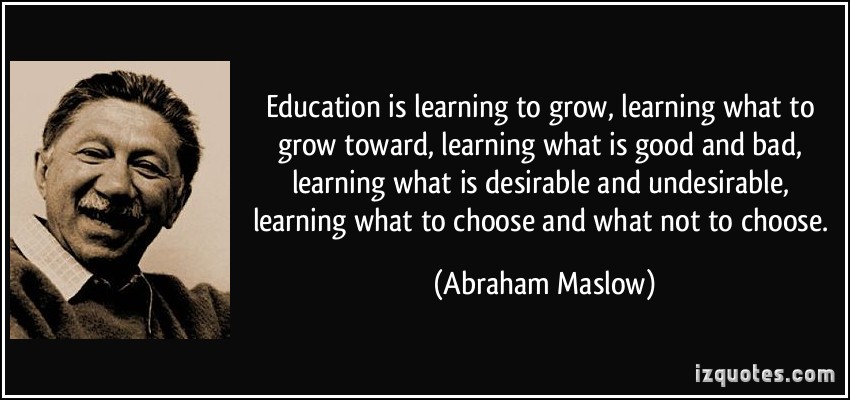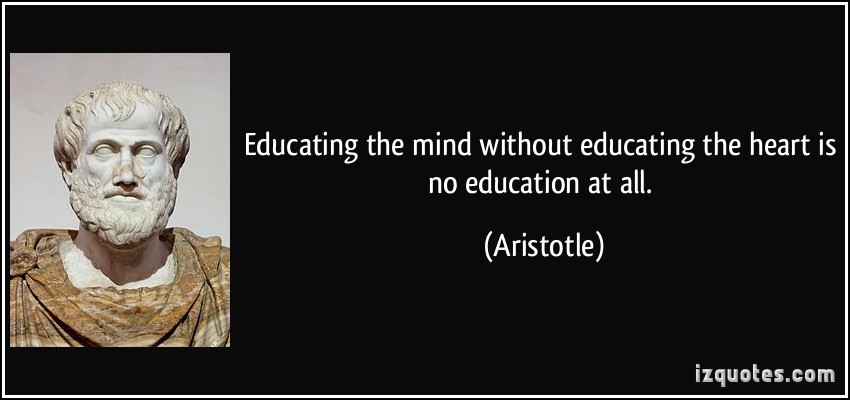
We live in a world with many complex problems, at all levels, local, regional and global. It is said thateducation is the key that opens the door to a more harmonious world.
The pertinent question is: What kind of education and learning would help us address these challenges and create a sustainable world and a better life for all? T.S. Eliot posed the question: "Where is the Life we have lost in living? Where is the wisdom we have lost in knowledge? Where is the knowledge we have lost in information?"
Reflecting on the questions above, we are going to need an education system that respects planetary boundaries, that recognises the dependence of human well-being on social relations and fairness, and that the ultimate goal is human happiness and ecological sustainability, not merely growth of material consumption.
In short, we need to listen to our hearts, re-learn what we think we know, and encourage our children to think and behave differently, to live more in synch with Nature.
If we do this successfully we can become wiser as a species, more “eco-logical.” We and the planet that gave birth to us can be happier and healthier, healed and transformed.
This must be very clear and obvious to everybody. But, it seems, not that obvious to our dogmatic, agenda-driven, neo-liberal, mumbo-jumbo- loving politicians and the so-called experts with their fancy MBAs from the fancy universities!
These fanciful people have created an education system which is devoid of any values, needed to build a better life, a better person, a better world.
Nowhere better this can be noted than a look at ‘their’ higher education bill (see below). It is mind- boggling, how dogmatic and destructive our democratically elected politicians can be!
I wonder if our education system and values are the main reason for why we keep voting against our own self interest! Think about it!
This higher education bill forces market dogma on our universities
‘Proposals to judge teaching quality by graduate earnings are a convenient way to ignore the causes of rising debt, falling salaries and the widening income gap’

This week we have learned that the number of state school pupils going to university is falling. At the same time, graduate earnings are stagnating, while the poorest students are being plunged into more and more debt. You might think it’s about time for the most radical reforms to higher education since 1992. Sadly, the new higher education bill is going to make it worse.
Our government says it is committed to widening attendance, pitching university fees as a trade-off for higher salaries. There is plenty to dislike about a bill that will turn our universities into a competitive marketplace of winners and losers, but one of its worst aspects is that it measures teaching quality according to the earnings of graduates. This is not fair or sensible. This is the dogma of market-imposed education: if you do well, you deserve it. If you don’t, it’s your fault.
Our government is setting up a system where failure to get a high-paying job is blamed on university teaching. It’s nothing to do with being working-class. Nothing to do with the colour of your skin. Nothing to do with the gender pay gap. It is simply because you didn’t invest enough in your education. It is because you didn’t make your market choice wisely enough.
It would also be true in reverse: a high-quality education is your ticket to a high salary. Tell that to black women.
If this were true, then it would also be true in reverse: a high-quality education is your ticket to a high salary. Tell that to black women. It’s not just wrong – it’s insulting to everyone who has to deal with structural inequalities across society.
Obviously, the amount you earn is affected by far more than what degree you took and how well you were taught. Your gender, sexuality and ethnicity play massive roles. Your social background plays a massive role. The state of the economy plays a massive role. Using salaries as a measurement of teaching quality makes no sense at all; still less as a justification for setting higher fees. Granted, there are benchmarks to widen participation, but this is a small and inadequate concession in the context of full marketisation.
Everyone wants our higher education system to be amazing. Nobody argues with that. But trying to judge higher education teaching according to graduate earnings is pointless. There is a simple way to test this. The next time you’re negotiating a pay rise, try telling your boss how satisfied you were with your undergraduate seminars. See how that goes.
The universities that will succeed if the higher education bill passes will be those that best prepare their students to earn higher and higher salaries. Forget the social value of your education: your salary is the measurement of your worth. Keep this in mind the next time you have to go to a hospital. That nurse who is caring for you – who may have £100,000 of debt, by the way – earns way less than a hedge-fund manager. According the bill’s logic, that nurse must have had a rubbish education. They probably have absolutely no idea what they’re doing.
The government is forcing market dogma onto our universities. Students will become consumers. Life after education will become a return on investment, with winners and losers. And, as is usually the case, the losers will be people who were already losing.
This article by Malia Bouattia, president-elect of the National Union of Students, and its black students’ officer, was first published in the Guardian on Monday 8 August 2016.
And finally, given the rubbish choices on offer at most “Centres of Learning and Excellence”, there is no wonder why they are now offering Bogof (Buy one get one free) degrees all over the place! Mind-boggling, again!
